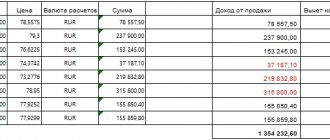Explanation of the term “currency control”
This term refers to the control of government bodies and authorized agents over compliance with currency legislation. In certain countries, the use of currency is subject to legal regulation. The Russian Federation is one of such states.
Foreign exchange transactions are controlled to ensure compliance with the exchange rate against the Russian ruble. Accordingly, the main purpose of why such control is needed is to protect the interests of the national Russian currency.
On the territory of Russia, currency control is carried out by the Government of the Russian Federation, as well as by authorities and authorized agents, including:
- Bodies - Central Bank of the Russian Federation, Federal Service for Financial and Budgetary Supervision.
- Agents - Vnesheconombank, customs and tax authorities, credit organizations, registrars (register holders), professional players in the securities market.
The main agent is the Central Bank of the Russian Federation. It is through the Bank of Russia that most of the tasks of currency control are implemented. For its part, the regulator monitors compliance with currency legislation by operators - credit institutions.
Who carries out currency control in the Russian Federation
The system is multi-level and is not represented by one person. The leading structural unit is the Government of the Russian Federation. It is developing a regulatory framework that addresses issues of foreign exchange transactions by domestic counterparties and foreigners. Other entities carry out supervisory activities over the implementation of legally established requirements.
Let's consider which authorized structures are responsible for implementing currency control (for example, banks), their responsibilities in Russia:
- Central Bank of Russia.
- Federal customs and tax services.
- Individual entrepreneurs (those in the register of investment advisers) and legal entities - managers, brokers, investment advisers, registrars, dealers, depositories.
- VEB.RF is a state development corporation.
- Authorized banks.
Commercial banks of the Russian Federation perform the functions of VC agents in accordance with the requirements of the legislation of the Russian Federation and instructions of currency control authorities. Typically, this activity includes:
- accounting of international contracts;
- checking documents justifying the operation;
- identifying facts of violations of laws;
- informing authorities and currency control agents about currency transactions and identified violations in the manner prescribed by law;
- carrying out transactions not related to commercial activities.
Almost all banking structures provide consultations for business representatives regarding VC.
Principles of exchange control
In Russia, in 2003, the federal law “On Currency Regulation and Currency Control” was adopted. This is the main legal act that reflects the principles of regulation of transactions with currency on the territory of the Russian Federation. The basic principles include:
- Priority of economic measures - control over operations is carried out with the aim of stabilizing the Russian economy.
- Complete exclusion of unjustified government intervention in foreign exchange transactions of residents and non-residents.
- The uniform nature of the country's foreign and domestic policies.
- Uniform nature of currency regulation and control.
- Ensuring that the state respects the rights of residents and non-residents when they carry out transactions with settlements in foreign currency.
Despite the refusal of some advanced countries to use this instrument, currency control often saves the country's economy from collapse. On the other hand, increased control often leads to the formation of shadow and “black” markets on the territory of a particular state.
Currency control authorities: rights and responsibilities
Authorized banks monitor the compliance of currency transactions verified by clients with the current currency legislation and submit reports on currency transactions to the Central Bank of the Russian Federation.
The main body of currency regulation and control in the Russian Federation is the Central Bank of the Russian Federation, which:
- determines the scope and procedure for circulation of foreign currency and securities in foreign currency in the Russian Federation;
- issues normative acts that are mandatory for execution in the Federation by residents and non-residents;
- conducts all types of foreign exchange transactions;
- establishes the rules for residents and non-residents to conduct transactions with foreign currency and securities in foreign currency, as well as the rules for non-residents in the Russian Federation to conduct transactions with currency and securities in the currency of the Federation;
- establishes the procedure for the mandatory transportation, import and transfer to the Russian Federation of foreign currency and securities in foreign currency owned by residents, as well as cases and conditions for residents to open accounts in foreign currency in banks outside the Federation;
- establishes general rules for issuing licenses to banks and other credit institutions to carry out foreign exchange transactions and issues such licenses, as well as uniform forms of accounting, reporting, documentation and statistics of foreign exchange transactions, including by authorized banks, as well as the procedure and deadlines for their submission;
- prepares and publishes statistics on foreign exchange transactions in the Russian Federation according to accepted international standards;
- performs other functions in accordance with the Law of the Russian Federation “On Currency Regulation and Currency Control”.
By currency control, the legislator understands the activities of the state aimed at ensuring currency legislation when carrying out currency transactions. Currency control is carried out by currency control authorities and their agents.
The main goals and directions of currency control are:
- determining the compliance of currency transactions carried out with current legislation and the availability of the necessary licenses and permits;
- checking the fulfillment by residents of obligations in foreign currency to the state, as well as obligations to sell foreign currency on the domestic foreign exchange market of the Russian Federation;
- checking the validity of payments in foreign currency;
- checking the completeness and objectivity of accounting and reporting on currency transactions, as well as on transactions of non-residents in rubles.
Residents and non-residents carrying out currency transactions in the Russian Federation with rubles and securities in Russian rubles are obliged to:
- provide the above organizations with all the documents and information they request regarding the implementation of currency transactions;
- for five years, retain all documentation relating to each currency transaction carried out;
- eliminate violations identified by currency control authorities.
Currency control can be carried out at different stages of currency transactions.
One of the main areas of currency control is control over the receipt of foreign currency earnings into the Russian Federation from the export of goods, the purpose of which is to ensure the receipt of foreign currency earnings in the Russian Federation to the accounts of exporters in authorized banks. Crediting foreign currency earnings to other accounts is permitted only with the permission of the Central Bank of the Russian Federation. For this purpose, there is a so-called “export transaction passport”, the procedure for maintaining which is determined by the joint Instruction of the Central Bank of the Russian Federation and the State Customs Committee of the Russian Federation dated October 12, 1993.
Another direction of currency control is the protection of the currency of the Russian Federation, Russian currency values in general. Hence, control over the import (export), transfer and shipment abroad and from abroad of Russian currency, foreign currency, as well as other currency values.
The system of organizations exercising control over the legality of foreign exchange transactions is two-stage. It includes currency control authorities and their agents (Fig. 37.1).
In accordance with the Federal Law “On Currency Regulation and Currency Control” of 2003, the currency control authorities in the Russian Federation are the Government of the Russian Federation, the Central Bank of the Russian Federation and the Accounts Chamber of the Russian Federation.
Currency control agents are organizations that, in accordance with the legislative acts of the Russian Federation, can perform currency control functions. Exchange control agents are accountable to the relevant exchange control authorities.
Authorized banks are currency control agents reporting to the Central Bank of the Russian Federation (Article 22, Part 3).
Currency control authorities, within the limits of their competence, issue regulations that are binding on all residents and non-residents of the Russian Federation.
Currency control authorities determine the procedure and forms of accounting, reporting and documentation for currency transactions of residents and non-residents (Part 1 of Article 23 of the Law of the Russian Federation “On Currency Regulation and Currency Control”).
Currency control authorities and agents exercise control over foreign exchange transactions carried out in the Russian Federation by residents and non-residents, over the compliance of these operations with legislation, the terms of licenses and permits, etc.; carry out inspections of currency transactions of residents and non-residents in the Russian Federation.
The rights and obligations of currency control authorities and agents and their officials are defined in Art. 23 of the Law “On Currency Regulation and Currency Control”.
Currency control bodies and agents and their officials, within their competence and in accordance with the legislation of the Russian Federation, have the right:
- carry out inspections of compliance by residents and non-residents with acts of currency legislation of the Russian Federation and acts of currency regulatory authorities;
- carry out checks of the completeness and reliability of accounting and reporting on foreign exchange transactions of residents and non-residents;
- request and receive documents and information related to conducting currency transactions, opening and maintaining accounts. The mandatory period for submitting documents at the request of currency control authorities and agents cannot be less than seven working days from the date of submission of the request.
Currency control authorities and their officials, within their competence, have the right to:
- issue orders to eliminate identified violations of acts of currency legislation of the Russian Federation and acts of currency regulatory authorities;
- apply the penalties established by the legislation of the Russian Federation for violation of acts of currency legislation of the Russian Federation and acts of currency regulatory authorities.
The procedure for residents and non-residents to submit supporting documents and information when carrying out currency transactions to currency control agents is established:
- for submission to currency control agents, with the exception of authorized banks, - by the Government of the Russian Federation;
- for submission to authorized banks - the Central Bank of the Russian Federation.
In order to implement currency control, currency control agents, within their competence, have the right to request and receive from residents and non-residents the following documents (copies of documents) related to conducting currency transactions, opening and maintaining accounts:
- documents proving the identity of an individual;
- document on state registration of an individual as an individual entrepreneur;
- documents certifying the status of a legal entity - for non-residents, a document on state registration of a legal entity - for residents;
- certificate of registration with the tax authority;
- documents certifying the rights of persons to real estate;
- documents certifying the rights of non-residents to carry out currency transactions, open accounts (deposits), drawn up and issued by the authorities of the country of residence (place of registration) of the non-resident, if the receipt by the non-resident of such a document is provided for by the legislation of a foreign state;
- notification of the tax authority at the place of registration of the resident about the opening of an account (deposit) in a bank outside the territory of the Russian Federation;
- registration documents in cases where pre-registration is provided in accordance with this Federal Law;
- documents (draft documents) that are the basis for conducting currency transactions, including agreements (agreements, contracts), powers of attorney, extracts from the minutes of a general meeting or other governing body of a legal entity; documents containing information about the results of auctions (if they are held); documents confirming the fact of transfer of goods (performance of work, provision of services), information and results of intellectual activity, including exclusive rights to them, acts of government bodies;
- documents prepared and issued by credit institutions, including bank statements; documents confirming currency transactions;
- customs declarations, documents confirming the import into the Russian Federation of the currency of the Russian Federation, foreign currency and foreign and domestic securities in documentary form;
- transaction passport.
Currency control agents have the right to require the submission of only those documents that are directly related to the currency transaction being conducted.
All documents must be valid on the day of presentation to exchange control agents. At the request of the currency control agent, duly certified translations into Russian of documents executed in whole or in any part in a foreign language are provided. Documents emanating from government bodies of foreign countries confirming the status of non-resident legal entities must be legalized in the prescribed manner. Foreign official documents may be presented without their legalization in cases provided for by an international treaty of the Russian Federation.
Currency control authorities and tax authorities carrying out pre-registration in accordance with this Federal Law are, within their competence, obliged to consider applications from residents for pre-registration required in accordance with this Federal Law and make a decision on pre-registration or refusal of pre-registration.
Currency control agents and their officials are obliged to:
- exercise control over compliance by residents and non-residents with acts of currency legislation of the Russian Federation and acts of currency regulatory authorities;
- provide currency control authorities with information on currency transactions carried out with their participation in the manner established by acts of currency legislation of the Russian Federation and acts of currency regulation authorities.
Currency control bodies and agents and their officials are obliged to preserve, in accordance with the legislation of the Russian Federation, commercial, banking and official secrets that become known to them in the exercise of their powers.
Currency control bodies and agents, if there is information about violation of acts of currency legislation of the Russian Federation and acts of currency regulation bodies by a person carrying out currency transactions, or about the opening of an account (deposit) in a bank outside the territory of the Russian Federation, sanctions to which are applied in accordance with the legislation of the Russian Federation Federations by another currency control authority shall transmit to the currency control authority, which has the right to apply sanctions to this person, the following information:
- in relation to a legal entity - name, taxpayer identification number, place of state registration, its legal and postal addresses, content of the violation indicating the violated regulatory legal act, date of commission and amount of the illegal currency transaction or violation;
- in relation to an individual - last name, first name, patronymic, information about the identity document, address of residence, the content of the violation indicating the violated regulatory legal act, the date of commission and the amount of the illegal currency transaction or the specified violation.
Currency control bodies and agents and their officials bear responsibility under the legislation of the Russian Federation for failure to perform the functions established by this Federal Law, as well as for their violation of the rights of residents and non-residents.
If any violations are detected, currency control authorities have the right to independently apply sanctions permitted by law.
What transactions are subject to exchange control
This federal law reflects an exhaustive list of operations subject to government regulation. Among them:
- Transactions between residents and non-residents.
- Transactions with internal and external securities.
- Transactions made in the national currency of the Russian Federation and foreign banknotes.
Transactions by residents in foreign currency, as well as transfers in Russian rubles in favor of non-residents, are subject to mandatory control. At the same time, non-residents make transfers in foreign currency without limits on the amount and restrictions of other types.
How is currency control carried out in practice?
Currency control services are provided by all credit organizations operating in the cash settlement services segment. Consequently, this service is mandatory in most cases. In order to understand the principle of currency control, it is enough to simulate a typical situation.
If a company earns money in foreign currency, then on the way to receiving money it passes one serious obstacle. This obstacle is currency control. That is, the company will not be able to withdraw money or dispose of it in any other way until it proves the nature of its legal origin.
Regulation is carried out in order to control the implementation of transactions: companies and entrepreneurs are checked for facts of money laundering, terrorist financing, cooperation with fraudsters, and the purchase and sale of goods prohibited for circulation in Russia.
Currency control using the example of Alfa-Bank →
For companies providing services, currency control always starts with the credit institution. When money from a transaction arrives at the bank, it does not immediately appear in the company’s account—the bank must check the legality and purity of the transaction or individual operation. If the bank doubts the legality of a transaction/individual operation, it will not release the money to the client until the client provides supporting documents.
How to pass it
Features and recommendations, compliance with which will help to successfully complete the process:
- In agreements concluded between participants in foreign trade activities, all conditions, including deadlines, must always be spelled out in detail.
- Cash payments must be made within the terms established by the agreement. The legal entity is obliged to identify the funds received by the bank within 15 working days (provide the bank with documents justifying the receipt of money). If the amount under the agreement exceeds 6 million rubles, it is subject to mandatory bank accounting.
- Additionally, it will be necessary to provide a certificate of supporting documents.
How to open a foreign currency account
Opening is necessary for conducting operations by a legal entity and entrepreneur, such as:
- settlements with international partners in foreign currency without conversion;
- obtaining borrowed funds;
- investments in foreign organizations;
- acquisition of shares, bonds and other securities;
- payment for real estate;
- purchase and storage of foreign currency;
- receiving interest on deposits;
- remuneration of company employees under labor and civil law contracts.
Typically, opening an account is free for business representatives. You only need to pay for servicing a specific package of services. First of all, you need to go to the official portal of the bank and leave an electronic application. Then you will need to provide a complete list of documentation. The verification is usually carried out within 1-3 business days, after which an agreement is signed for servicing the account by the banking organization.
Open a business account at SEA BANK and receive up to 6% on your account balance!
How is the legality of a transaction using currency confirmed?
The list of documents to confirm the legality of a transaction varies. The number of securities, as a rule, depends on the type of transaction. The bank requests documents from the client, who, in turn, is obliged to provide them within the established time frame.
In accordance with Art. 23 173-FZ, currency control authorities and agents have the right to request documents from companies within a period of at least 7 working days. The exact period is counted from the moment the company receives the request.
The list of documents sent by the company at the request of currency control authorities and agents is specified in the same article of the federal law. The list is provided in an exhaustive form, but it is not necessary to fully apply it in every case. The documents requested for verification include the following:
- Identification.
- Certificate of registration as an individual entrepreneur.
- Data on registration of a legal entity (for residents).
- Information about property rights.
- Certificates of registration with the tax authority.
- Registration documents.
- Draft documentation related to currency transactions.
- Documents and data issued by credit institutions - statements, bank control statements.
- Customs declarations.
- Transaction passport.
- Insurance contracts.
- Written notifications about the assignment of claims to a factor (financial agent).
Agents and currency control authorities have the right to request only those documents that directly relate to a specific transaction. Moreover, all documents must be valid at the time of their submission to the control authorities. The data is provided in the original or in a copy certified in a special form.
Can the Central Bank be considered the main currency control body in the Russian Federation?
As noted above, the currency regulation authorities in the Russian Federation are both the Government of the Russian Federation and the Central Bank of the Russian Federation. In Art. 5 of Law No. 173-FZ, both are indicated as equivalent - priority is not given to anyone.
If we consider the functionality performed and the set of powers, it is also difficult to determine whether one of this pair is “more important”.
Therefore, we can conclude that there are essentially two main bodies of currency control: the government and the Central Bank. It is difficult to single out one and put it above the other.
But we should not forget that in fact currency control is carried out by customs structures. Read more about this in a special material from ConsultantPlus experts. Get a free trial.
Responsibility for violation of currency control regulations
Organizations, individual entrepreneurs, and individuals must comply with legislative requirements for compliance with currency control regulations. In most cases, market participants violate reporting deadlines (if we are talking about “pure” market participants). In accordance with Art. 15.25 of the Administrative Code, failure to comply with reporting deadlines entails the following types of administrative liability:
- No more than 10 days - warning or fine: citizens - 300-500 rubles; officials - 500-1000 rubles; legal entities - 5,000-15,000 rubles.
- No more than 30 days - administrative fine: citizens - 1000-1500 rubles; officials - 2000-3000 rubles; legal entities - 20,000-30,000 rubles.
- More than 30 days - administrative fine: citizens - 2500-3000 rubles; officials - 4000-5000 rubles; legal entities - 40,000-50,000 rubles.
Repeated violations committed by citizens, officials, and legal entities imply an increase in the amount of the administrative fine several times. Consequently, delay in fulfilling the requirements of an agent or authorized body can be quite costly for a market player.
5 / 5 ( 1 voice )
about the author
Irina Rusanova - higher education at the International East European University in the direction of "Banking". Graduated with honors from the Russian Economic Institute named after G.V. Plekhanov with a major in Finance and Credit. Ten years of experience in leading Russian banks: Alfa-Bank, Renaissance Credit, Home Credit Bank, Delta Credit, ATB, Svyaznoy (closed). He is an analyst and expert of the Brobank service on banking and financial stability. [email protected]
Is this article useful? Not really
Help us find out how much this article helped you. If something is missing or the information is not accurate, please report it below in the comments or write to us by email
Comments: 0
Your comment (question) If you have questions about this article, you can tell us. Our team consists of only experienced experts and specialists with specialized education. We will try to help you in this topic:
Author of the article Irina Rusanova
Consultant, author Popovich Anna
Financial author Olga Pikhotskaya




